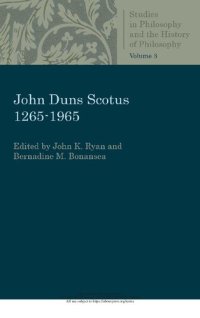
Ebook: John Duns Scotus: 1265-1965 (Studies in Philosophy and the History of Philosophy)
- Year: 2018
- Publisher: The Catholic University of America Press
- Edition: Reprint
- Language: English
- pdf
FOREWORD
The names of certain of the great scholastic thinkers of the middle
ages-St. Anselm, Abelard, Hugh of St. Victor, St. Albert the Great,
St. Thomas Aquinas, St. Bonaventure, Roger Bacon, John Duns
Scotus, Henry of Ghent, and the rest-are familiar not only to
students of philosophy and theology but also in varying degrees to
the educated public. Abelard is known for his Historia calamitatum
and as a figure in romantic literature, if not for his work in ethics
and the theory of knowledge. Like Zeno's paradoxes and the
Cartesian "cogito ergo sum," a passage in St. Anselm has become
the subject of unending discussion. Certain of St. Bonaventure's
books have been translated and find readers. But with the exception of St. Thomas Aquinas first-hand knowledge of the writings of
the medieval masters is not a common thing.
For reasons that have varied throughout the modem era John
Duns Scotus has not always received the general recognition
that what he was and what he did should have brought to him.
However, inadequate understanding and even hostility are being
displaced by something better. Appropriately, this change is due
in large measure to the research and writings of his fellow
Franciscans, but the books and articles of many other scholars have
aided them in their labors. As a result, the record of Scotus' life
has been made fuller and clearer, what he actually taught on
various subjects has been brought to light, and translations of his
writings begin to appear. But the most important thing of all is
the essential work of the Commissio Scotistica on the canon and
the critical edition of his writings, which proceeds year by year in
spite of the inherent difficulties of the task and those caused by the
turmoil of our era. To all such labors the present volume, a cooperative effort of European, American, and Canadian scholars,
is added as a further monument raised in honor of John Duns
Scotus on the seventh centennial of his birth.
JOHN K. RYAN
The names of certain of the great scholastic thinkers of the middle
ages-St. Anselm, Abelard, Hugh of St. Victor, St. Albert the Great,
St. Thomas Aquinas, St. Bonaventure, Roger Bacon, John Duns
Scotus, Henry of Ghent, and the rest-are familiar not only to
students of philosophy and theology but also in varying degrees to
the educated public. Abelard is known for his Historia calamitatum
and as a figure in romantic literature, if not for his work in ethics
and the theory of knowledge. Like Zeno's paradoxes and the
Cartesian "cogito ergo sum," a passage in St. Anselm has become
the subject of unending discussion. Certain of St. Bonaventure's
books have been translated and find readers. But with the exception of St. Thomas Aquinas first-hand knowledge of the writings of
the medieval masters is not a common thing.
For reasons that have varied throughout the modem era John
Duns Scotus has not always received the general recognition
that what he was and what he did should have brought to him.
However, inadequate understanding and even hostility are being
displaced by something better. Appropriately, this change is due
in large measure to the research and writings of his fellow
Franciscans, but the books and articles of many other scholars have
aided them in their labors. As a result, the record of Scotus' life
has been made fuller and clearer, what he actually taught on
various subjects has been brought to light, and translations of his
writings begin to appear. But the most important thing of all is
the essential work of the Commissio Scotistica on the canon and
the critical edition of his writings, which proceeds year by year in
spite of the inherent difficulties of the task and those caused by the
turmoil of our era. To all such labors the present volume, a cooperative effort of European, American, and Canadian scholars,
is added as a further monument raised in honor of John Duns
Scotus on the seventh centennial of his birth.
JOHN K. RYAN
Download the book John Duns Scotus: 1265-1965 (Studies in Philosophy and the History of Philosophy) for free or read online
Continue reading on any device:

Last viewed books
Related books
{related-news}
Comments (0)